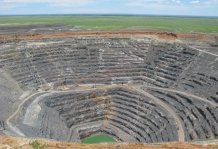
The project will improve understanding of environmental liabilities and risks associated with mining operations.
Environmental research of global significance
The University of Exeter is engaging in a global research project to improve understanding of environmental liabilities and risks associated with mining operations.
The ‘Environmental Indicators’ project represents a new international collaboration between the University of Tasmania, the Australian Cooperative Research Centre for Optimising Resource Extraction (CRC ORE) and the University of Exeter.
The project is focused on mineralogical and geochemical attributes of rocks that are likely to influence environmental performance and management of ores and wastes during mineral processing, product manufacture and waste disposal. This will be based on new and improved laboratory testing procedures designed to provide predictive indicators. Fundamental information will be provided for future management tools needed by industry to predict waste and ore characteristics such as acid mine drainage.
The need for such research has been widely recognised in the industry. A number of companies have identified that a well organised and implemented approach to acid mine drainage can have significant financial benefits, with some suggesting that as little as a 10 per cent reduction in liability may be worth tens of millions to Net Asset Value.
The $1.7 million research project is led by Professor Bernd Lottermoser, who was recently appointed Chair of Environmental Geochemistry at the University of Exeter’s new Environment and Sustainability Institute (ESI).
Bernd joins Exeter from the University of Tasmania. In his varied career, he has worked as an exploration geologist and environmental consultant in the mining industry and also in research and academic instruction at Australian and German universities. Bernd has 25 years experience in environmental geochemistry and has worked on projects in Australia, Papua New Guinea, Indonesia, Singapore, Sri Lanka, Germany, Spain and the UK.
As well as leading the 'Environmental Indicators' project, he will be working with colleagues from the Camborne School of Mines and the ESI’s interdisciplinary team on trace metal transfer processes in terrestrial landscapes. Bernd will continue his close collaborations with earth scientists of the University of Tasmania.
Professor Lottermoser said: “This major, collaborative research project reflects the fact that both universities, Exeter and the University of Tasmania, are international in scope, vision and standard.”
Date: 17 October 2012
